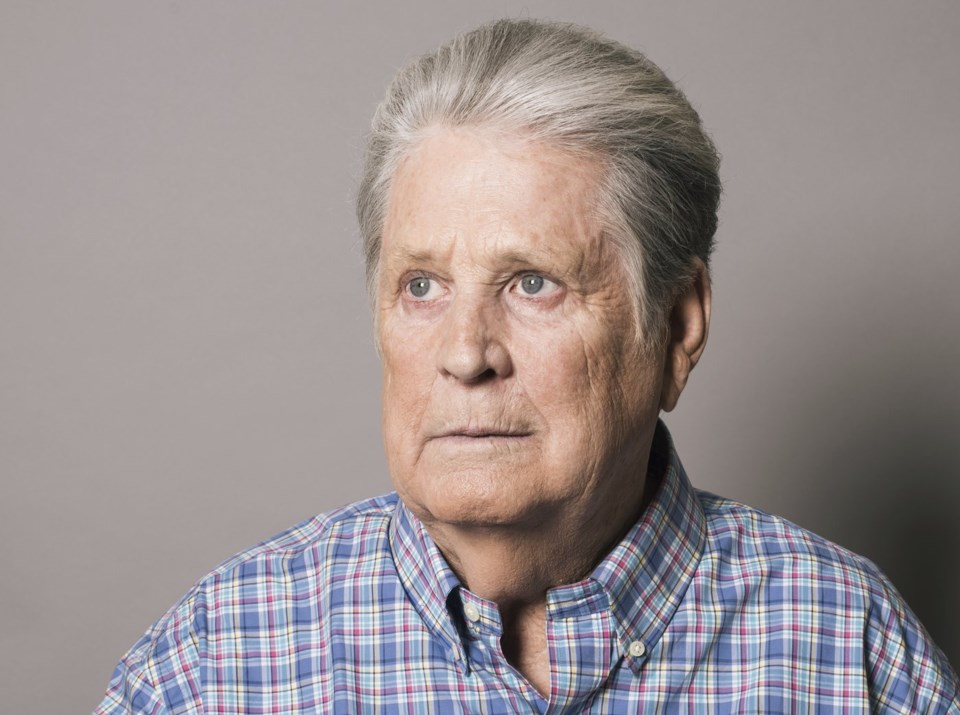NEW YORK (AP) â Brian Wilson, the Beach Boysâ visionary and fragile leader who helped compose and arrange âGood Vibrations,â âCalifornia Girlsâ and dozens of other summertime anthems and became one of the worldâs most influential and admired musicians, has died at 82.
Wilsonâs family posted news of his death to his website Wednesday. Further details werenât immediately available. Since May 2024, Wilson had been under a court conservatorship to oversee his personal and medical affairs, with Wilsonâs longtime representatives in charge.
The eldest and last surviving of three musical brothers â Brian played bass, Carl lead guitar and Dennis drums â he and his fellow Beach Boys rose from local act to national hitmakers to international ambassadors of the American dream. Wilson himself was celebrated for his beautiful music and pitied for his demons. He was one of rockâs great Romantics, a tortured soul who in his peak years embarked on an ever-steeper quest for aural perfection.
The Beach Boys rank among the most popular acts of the rock era, with more than 30 singles in the Top 40 and worldwide sales of more than 100 million. 1966's âPet Soundsâ was voted No. 2 in a 2003 Rolling Stone list of the best 500 albums, losing out, as Wilson did from the start, to the Beatlesâ âSgt. Pepperâs Lonely Hearts Club Band.â The Beach Boys, who also featured Wilson cousin Mike Love and family friend Al Jardine, were voted into the Rock & Roll Hall of Fame in 1988.
Fans ranged from Elton John and Bruce Springsteen to Katy Perry and Bob Dylan. The Whoâs drummer, Keith Moon, fantasized about joining the Beach Boys. Paul McCartney cited âPet Soundsâ as a direct inspiration on the Beatles and said the ballad âGod Only Knowsâ often moved him to tears.
Their music was like an ongoing party, with Wilson as mastermind and wallflower. He was a tall, shy man, partially deaf (allegedly because of beatings by his father, Murry Wilson), with a sweet, crooked grin, and he rarely touched a surfboard unless for publicity. But out of the lifestyle that he observed and such musical influences as Chuck Berry and the Four Freshmen, he devised a magical and durable soundscape â easy melodies, bright harmonies, vignettes of beaches, cars and girls that resonated worldwide.
Decades after its first release, a Beach Boys song can still conjure up instant summer â the wake-up guitar riff that opens âSurfinâ USAâ; the melting harmonies of âDonât Worry Babyâ; the chants of âfun, fun, funâ or âgood, good, GOOD, good vibrationsâ; the behind-the-wheel chorus ââRound, âround, get around, I get around.â Beach Boys songs have cheered on generations from iPods and boom boxes, radios and 8-track players, and any device that could be placed on a beach towel.
The Beach Boysâ innocent appeal survived changing trends and times and the groupâs increasingly troubled backstory â Brianâs many personal trials; allegations of their father's mismanagement and physical abuse; feuds and lawsuits; the alcoholism of Dennis Wilson, who drowned in 1983. Brian Wilsonâs ambition took the Beach Boys into territory far beyond the simple pleasures of their early hits â transcendent, eccentric and destructive. They seemed to live out every fantasy, and every nightmare, of the California myth.
Brian Wilson was born June 20, 1942, two days after McCartney. His musical gifts were obvious and as a boy he was playing piano and teaching his brothers to sing harmony. The Beach Boys started as a neighborhood act, rehearsing in Brianâs bedroom and in the garage of their house in suburban Hawthorne, California. Surf music was catching on locally and Dennis, the groupâs only real surfer, suggested they cash in. Brian and Love hastily wrote up their first single, âSurfin,ââ a minor hit released in 1961.
They wanted to call themselves the Pendletones, in honor of a popular shirt. But when they first saw the pressings for âSurfin,ââ they discovered the record label had tagged them âThe Beach Boys.â Other decisions were handled by their father, a musician and apparent tyrant who hired himself as the manager and holy terror. By mid-decade, Murry Wilson had been displaced and Brian was in charge.
Their breakthrough came in early 1963 with âSurfinâ USA,â so closely modeled on Chuck Berryâs âSweet Little Sixteenâ that Berry successfully sued to get a songwriting credit. It was their first Top 10 hit and a boast to the nation: âIf everybody had an ocean / across the USA / then everybodyâd be surfinâ, / like Cali-for-nye-ay.â From 1963-66, they were rarely off the charts, hitting No. 1 with âI Get Aroundâ and âHelp Me, Rhondaâ and narrowly missing with âCalifornia Girlsâ and âFun, Fun, Fun.â For their many television appearances, they wore candy-striped shirts and grinned as they mimed their latest hit, with a hot rod or surfboard nearby.
Wilson often contrasted his own bright falsetto with Loveâs nasal, deadpan tenor. The extroverted Love was out front on the fast songs, but when it was time for a slow one, Brian often took over. âThe Warmth of the Sunâ was a song of despair and consolation that Wilson alleged â to some skepticism â he wrote the morning after President John F. Kennedy was assassinated. âDonât Worry Baby,â a ballad equally intoxicating and heartbreaking, was a leading manâs confession of doubt and dependence, an early peek at Brianâs crippling insecurities.
His first marriage, to singer Marilyn Rovell, ended in divorce and he became estranged from daughters Carnie and Wendy, who would help form the pop trio Wilson Phillips. His life stabilized in 1995 with his marriage to Melinda Ledbetter, with whom he had daughters Daria and Delanie. He also reconciled with Carnie and Wendy and they sang together on the 1997 album âThe Wilsons.â Melinda Ledbetter died in 2024.
Hillel Italie, The Associated Press



